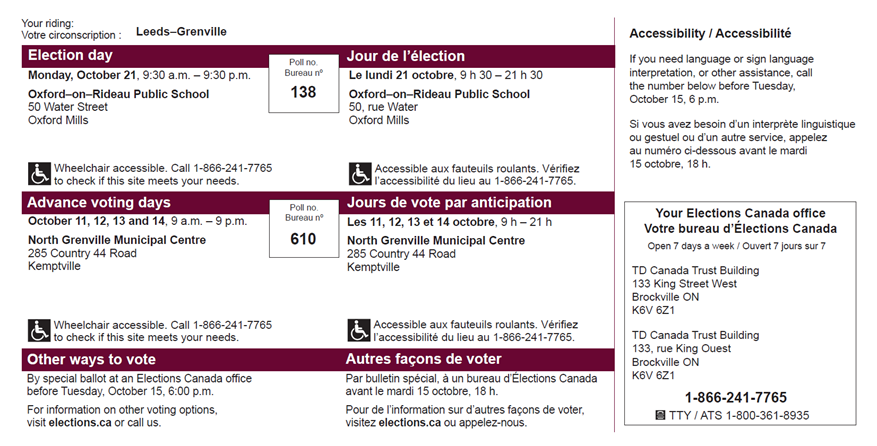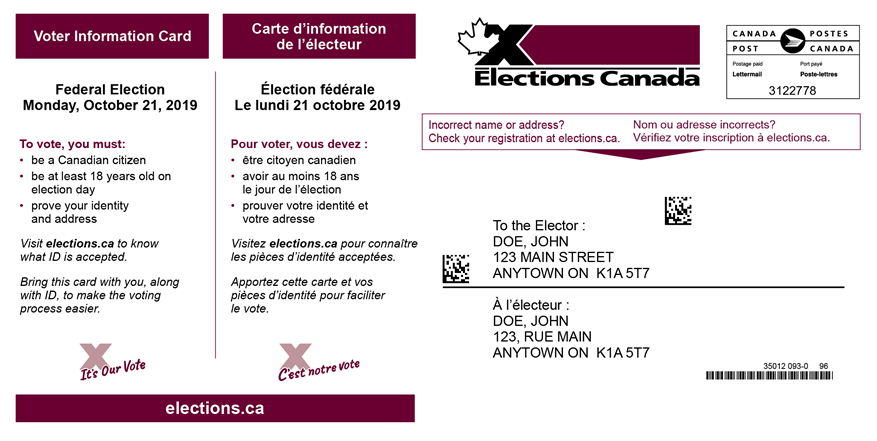What to Know Before a Federal Election
What is the federal election?
The Canadian federal election is when we, as Canadian citizens, vote to elect a local Member of Parliament (MP) who will represent our interests in the House of Commons. In this process, we indirectly vote for our new Prime Minister.
The House of Commons is an important part of the legislative (law-making) branch of Canada’s government. It brings together elected representatives from across Canada to debate issues and make decisions. The House of Commons makes up one-third of our Parliamentary democracy; the other two-thirds are the Sovereign (Queen or King) and the Senate.
You vote for a candidate or political party in your electoral district. The political party with the most representatives elected wins the election. The leader of that party then becomes the Prime Minister.
When do federal elections take place?
The Canada Elections Act specifies that a general election must be held on the third Monday in October in the fourth calendar year following the previous election. However, it also allows for an election to be called before four years have passed. This may take place if the Governor General accepts the Prime Minister’s advice to dissolve Parliament.
What is the federal government responsible for?
Canada has three levels of government:
- federal
- provincial or territorial
- municipal (city)
The Prime Minister heads the federal government based in Ottawa. It deals with national and international matters, such as:
- taxes
- money
- banking
- shipping
- railways
- pipelines
- telephones
- criminal law
- foreign affairs
- national defence
- employment insurance
- Indigenous lands and rights
Under Canada’s Constitution, responsibility for immigration is shared between the federal and provincial/territorial governments.
What is my electoral district?
An electoral district is a geographical area represented by an MP. Citizens in that area elect one MP who sits in the House of Commons and represents them as well as all Canadians.
There are 338 electoral districts, also known as constituencies or ridings, in Canada.
Nova Scotia has 11 electoral districts:
|
|
You can find your electoral district here: https://www.elections.ca/scripts/vis/FindED?L=e&PAGEID=20
Who is eligible to vote?
Any Canadian citizen 18 years of age or older is eligible to vote in the election.
Do I need to register to vote?
You must be registered with Elections Canada in order to vote.
You can register to vote on the day of the election at the polls, or you can register in advance. Registering to vote in advance will ensure you get a voter information card, which will make your voting process easier and faster.
If you are already registered, you will receive a voter information card in the mail after the election is called. The card tells you when and where you can vote.
If you do not receive a card or the information is wrong, you may not be registered to vote, or your information may not be up to date. You can check this information online, in person, or by phone.

Source: Elections Canada
How to register
Online: To register or check your registration status, click here.
By mail: Contact Elections Canada, and they will send you a voter registration form by mail, email, or fax.
In-person: After an election is called, you can go to your local Elections Canada office in advance to register or register at your polling place on the day of the election.
On your tax return: Check the Elections Canada boxes that allow Revenue Canada to share your name, address, date of birth, and citizenship with Elections Canada to update their National Register of Electors.
Why vote?
Voting is an important civic duty for all Canadians. By voting, you are ensuring your voice is heard and that you have a say in who represents you at a national level, as well as who leads this country. By voting, you help elect important decision-makers whose choices will impact you and your loved ones.
Who am I voting for?
You vote for a Member of Parliament (MP) in your area. Even if your MP’s party doesn’t win, they will be your area’s representative in parliament.
When you vote for a candidate who belongs to a political party, you also support the leader of that party. The leader of the political party with the most votes becomes the Prime Minister.
How do I choose who to vote for?
Voting is a very personal matter. Other people may share their opinions on who to vote for, but ultimately, only you can decide who you vote for.
When voting, you need to decide what is important to you. You then choose a party or candidate that most closely fits what you feel is important.
Each candidate has a platform. Their platform shares their ideas on what is important, how to spend tax dollars, and more. These platforms are online, but candidates will also distribute flyers, have ads in newspapers, speak at events, go door-to-door, etc., to let people know what their priorities are.
Listen to what the candidates have to say, make an informed decision, and vote.
What identification (ID) do I need to vote?
To vote, you must prove your identity and address.
There are three options to do this:
Option 1: Show one piece of government-issued photo ID that contains your name and address.
Examples: Driver’s licence or Nova Scotia identification card
Option 2: Show two pieces of ID. Both must have your name on it, and at least one must have your current address.
Examples: Voter information card, bank statement or utility bill, and student ID card. To see a full list of accepted IDs, click here.
Option 3: Declare your identity and address in writing, and have someone who knows you and who is assigned to your polling station vouch for you.
The voucher must be able to prove their identity and address. A person can vouch for only one person (except in long-term care institutions).
